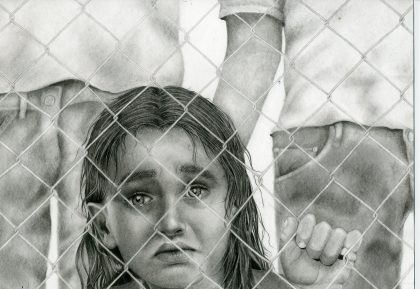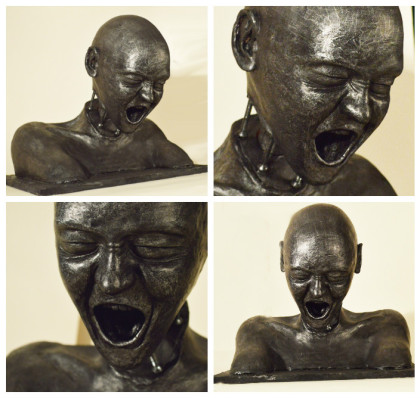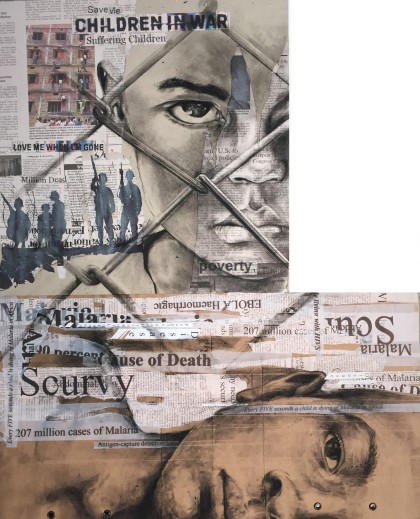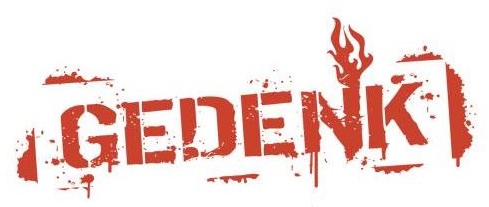The Gedenk Award for Tolerance is given to students whose works examines their role in cultivating tolerance. Through our partnership with Grammy Award-winning artist Miri Ben-Ari and her organization The Gedenk Movement, the 2016 Scholastic Art & Writing Awards recognized three writers and three artists for their works reflecting on the importance of increasing tolerance to safeguard a peaceful society. Along with their award, each student will also receive a $1,000 scholarship!
Meet the 2016 Gedenk Award for Tolerance recipients:
Jasmine Cui is from Rochester, NY, and attends The Harley School
“My piece highlights the importance in cultivating tolerance, and the ways in which acts of intolerance damage the fabric of society.”
Excerpt from “Passivity is Passé”
As children of minority, we had been taught to apologize lest we risked becoming the next Michael Brown or Ahmed Mohamed or Xinran Ji. In the immigrant community, it was a habit so deeply ingrained in us that it felt not so much like a habit, so much as it did a way of life—a movement which came as fluidly as breathing. We had cultivated a society fraught with passivity. One which allowed others to pass over, through, and by us. We told ourselves that we were simply “living cautiously.” I’m not sure we were living at all. In retrospect, it was quite ridiculous; if someone shot you, the Emergency Room doctor wouldn’t say “oh, well, get him some ice. Have a Band-Aid.” No, they’d say, “get him to surgery and give him some goddamn sutures.” In similar vein, we were merely applying a topical treatment to an issue which ran deeper and was far more severe than we liked to admit. And in doing so, we had facilitated the spread of an epidemic. We had allowed the society around us to become profoundly racist.
Lauren Wyman is from Wilton, CT, and attends Wilton High School

“In a time of fear and chaos, people are especially prone to developing prejudices. It is at times like these where we must be the most tolerant towards these people in need.”
Aidan Forster is from Greenville, SC, and attends Fine Arts Center
“This poem addresses my sexuality, my relationship with my family, and how those things intersect. I feel it garners tolerance because there are a lot of teenagers today who don’t have supportive families and feel that they have to suppress certain aspects of their identities.”
Excerpt from “Summers at the Bottom of the Ocean”
1.
The clink of a belt being undone is the most sexual noise—
more so than whispers of white sheets,
cousins to the cold morning wind. Here is where it happens.
A bed, regulation bunk, raised halfway into the air
on stilts. We are two parasites balanced
on the head of a great heron. Its wings are elongated—
its beak turned towards the window
The threads of sunlight unspool.
His sheets are blue— the door is locked—
his hands fumble with the brown leather belt
around his waist. Something in its clink,
the whisper of leather and metal, two passionate lovers,
is more than I can bear. I once thought a kingfisher
was a fish and not a bird— I marveled at its nest
floating above the waves, fashioned from mermaid combs
and fan shells, broken pieces of pinkish coral. A kingfisher
is a bird— there is no mystery in its feathers, but rather a cracked sunset.
He didn’t know either— content in his ignorance he played with my hair.
Afterwards, we buy two bottles of Coke from the vending machine
in the hall. We drink them as the sun busies itself around us.
I didn’t think once about my father.
Maribel Alverson is from Austin, TX, and attends McCallum High School

“My work deals with the unfair treatment of those with mental disorders…[M]y sculpture depicts the feelings that come from utter intolerance from lack of understanding and empathy, hence the name, which suggests some insanity and the breakdown of stability.”
Daniel Wu, Grade 10, Age 15, Timber Creek High School, Orlando, FL
“The topic I explore, and ultimately reject, in my essay, I find to be the basis of Anti-Tolerance. By briefly exploring Fear of the Other and its ingrained role within modern prejudice, I hope to enlighten readers to their own cognitive biases, and encourage each of them to reject an oppressive mindset. This course of action will lead to tolerance, and an egalitarian society.”
Excerpt from “Fear Itself”
In the wake of a horrible attack on Paris, in an age where it seems new threats are called in daily, the political forum is understandably abuzz with discussion of how best to “win” the “War on Terror”. It seems that every one of us exists in a cultural milieu of fear; our TVs are constantly calling out new horrors, every unknown face presents an unknown risk, and each tick of a clock reminds us of our ever impending mortality.
The fact of the matter is, the War on Terror started far before the events of 9/11. From the first of us to the last of us, we are each engaged in our own War on Terror. The emerging narrative of our byzantine machinations to defeat fear, a veritable spider web of justification, oppression, and voluntary blindness, has never made the call for change so fierce. From the first civilizations onward, fear, the emotional equivalent of our physical appendixes, has created and continues to create a sprawling butterfly effect of institutional quandaries: racism, sexism, heteronormativity, and elitism, just to name a few, and continues to perpetuate worldwide issues, such as global warming, world hunger, and indeed, the colloquial “War on Terror”. Surely some fears are helpful, but the ongoing, unending, in fact, accelerating, impacts of our progressive fear of the Other must be combated. It seems that a consilience of fields points to one conclusion: This fear is redundant and damaging.
Erin Cho is from Kent, CT, and attends Kent School

“My piece, African Child, Disease and War deals with children in Africa, who are starving and suffering of war and disease. Also, the intolerance and violence to children that are forced to join the army and their sacrifice for the country is presented in my drawing.”
To learn more about Miri Ben-Ari and The Gedenk Movement, visit the following sites:
- Gedenk on the web: http://gedenkmovement.org
- Gedenk on Facebook: https://www.facebook.com/gedenkmovement
- Gedenk on Twitter: https://twitter.com/GedenkMovement
- Miri Ben-Ari on the web: http://miribenari.com/
- Miri on Facebook: https://www.facebook.com/miribenari
- Miri on Twitter: https://twitter.com/miribenari


